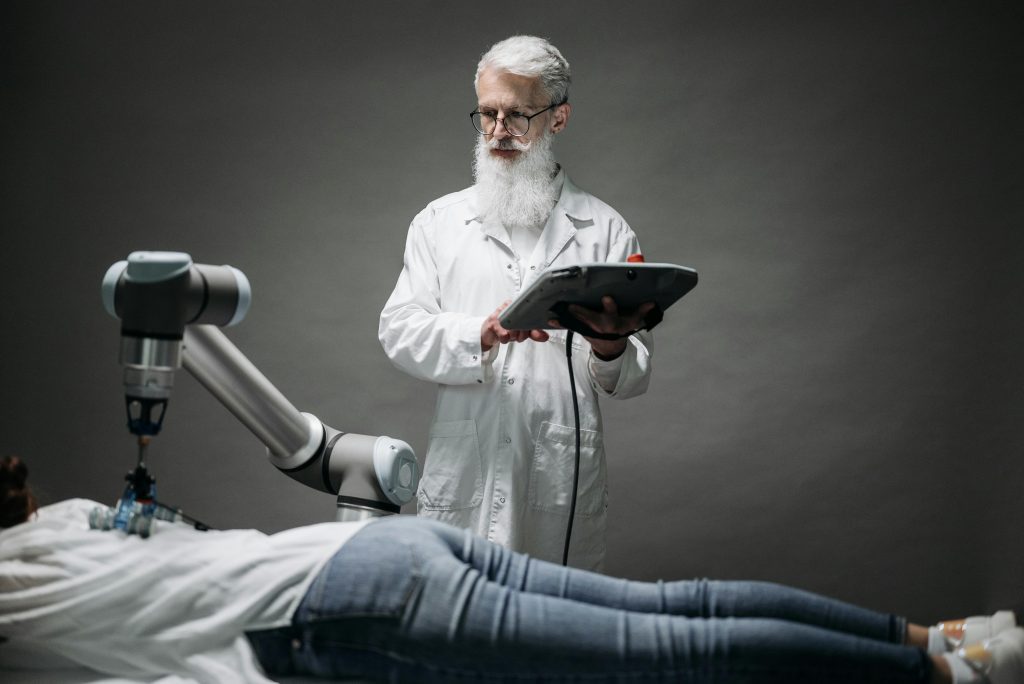Artificial Intelligence (AI) is reshaping nearly every aspect of modern life, and healthcare is among the most significantly transformed sectors. As we step into 2025, the integration of AI in healthcare is no longer experimental—it is foundational. From diagnostics and robotic surgery to patient monitoring and personalized medicine, AI-powered systems are revolutionizing how care is delivered, how decisions are made, and how lives are saved.
In this in-depth article, we explore the current and emerging applications of AI in healthcare, key innovations, real-world impact, ethical concerns, and the future of intelligent medicine. Whether you’re a healthcare professional, tech innovator, or policy maker, this article will provide a comprehensive understanding of AI’s role in the next generation of global healthcare.
1. Understanding AI in Healthcare
AI in healthcare refers to the use of algorithms, machine learning (ML), deep learning (DL), and data-driven models to mimic human cognition in analyzing complex medical data. AI systems are capable of:
- Recognizing patterns in patient data
- Predicting disease progression
- Automating administrative workflows
- Providing clinical decision support
Subfields such as Natural Language Processing (NLP) and Computer Vision are helping machines interpret unstructured text and medical imaging with unprecedented speed and accuracy.
2. Key Areas Where AI Is Transforming Healthcare
2.1. Diagnostic Accuracy
AI models, especially deep learning networks, are trained to detect diseases such as:
- Breast and lung cancer from radiology scans
- Skin cancer from dermatoscopic images
- Diabetic retinopathy through retinal photos
- Alzheimer’s disease through MRI data
Example: Google Health’s AI model achieved dermatologist-level accuracy in identifying skin cancer from photographs.
2.2. Predictive Analytics
Predictive models assess risk factors and predict outcomes:
- Identifying patients at high risk of readmission
- Early detection of sepsis or heart failure
- Forecasting patient deterioration in ICUs
Hospitals use AI dashboards for real-time risk stratification, allowing for proactive interventions.
2.3. Robotic Surgery
Robotic systems like the da Vinci Surgical System use AI for precision movements in minimally invasive procedures:
- Reduced recovery time
- Less blood loss
- Higher surgical accuracy
AI also assists surgeons by highlighting critical anatomy during procedures.
2.4. Virtual Health Assistants
AI-powered chatbots and virtual assistants are now offering:
- 24/7 symptom checking
- Appointment scheduling
- Medication reminders
- Emotional support via conversational AI
Apps like Ada Health, Babylon, and Woebot are leading the charge.
2.5. Drug Discovery & Development
AI reduces the time and cost of bringing new drugs to market:
- Predicting molecular behavior
- Simulating clinical trials
- Identifying new uses for existing drugs
Companies like DeepMind, BenevolentAI, and Insilico Medicine are pioneering AI in pharma research.
3. Personalized Medicine
AI enables truly individualized care:
- Genetic profiling for cancer therapies
- AI models tailoring treatment plans based on lifestyle, medical history, and real-time data
- Pharmacogenomics: predicting how patients will respond to drugs
Wearables like Fitbit and Apple Watch collect data used in AI-driven health apps for managing chronic illnesses such as diabetes and hypertension.
4. Hospital Operations and Workflow Automation
AI helps optimize internal processes:
- Predicting patient flow and resource allocation
- Automating billing, coding, and paperwork
- Managing supply chains and staffing needs
Hospitals report improved operational efficiency and reduced administrative burden.
5. AI in Mental Health
AI is addressing the growing mental health crisis:
- Chatbots providing CBT-based interventions
- Algorithms detecting early signs of depression from voice or social media data
- Wearables tracking stress and mood patterns
Example: MIT researchers developed an AI tool that detects depression based on speech patterns.
6. AI in Pandemic Management
AI tools were vital during COVID-19 and continue to play roles in:
- Tracking outbreaks using real-time data
- Modeling viral spread and hospital burden
- Accelerating vaccine research and distribution logistics
In future pandemics, AI will be a frontline defense mechanism.
7. Ethical, Legal, and Social Implications (ELSI)
7.1. Data Privacy and Security
Medical data is sensitive. Ethical AI must:
- Comply with HIPAA, GDPR, and local laws
- Use anonymization and encryption
- Prevent algorithmic bias and misuse
7.2. Algorithmic Bias
Bias in AI models can lead to:
- Misdiagnosis in underrepresented groups
- Inequitable treatment plans
- Disparities in health outcomes
Diversity in training datasets is essential.
7.3. Liability and Accountability
- Who is responsible if an AI system makes a harmful error?
- Legal frameworks must evolve to address these questions
7.4. Trust and Transparency
Patients and providers must understand AI decisions:
- Explainable AI (XAI) is key
- Transparency builds trust in AI-powered care
8. The Role of Governments and Policymakers
- Funding AI research in public health systems
- Setting ethical and safety standards
- Encouraging public-private collaboration
- Educating the healthcare workforce on AI tools
Global initiatives like WHO’s Global Strategy on Digital Health guide policy development.
9. Future Forecast: What to Expect by 2030
- AI triage systems in every ER and clinic
- Predictive models integrated into EHRs
- Home AI systems managing chronic care
- AI co-pilots for doctors during diagnostics and surgeries
- AI tutors training medical students via simulation
Investment in AI in healthcare is projected to exceed $120 billion by 2030.
Conclusion
AI in healthcare is no longer a future concept—it’s happening now. With tools that diagnose faster, monitor continuously, and personalize deeply, the entire patient journey is being reimagined. As we approach 2030, collaboration between technologists, clinicians, and policymakers is essential to ensure AI remains ethical, equitable, and effective.
Healthcare powered by AI will not replace human care—but it will make it smarter, more accessible, and far more impactful.

